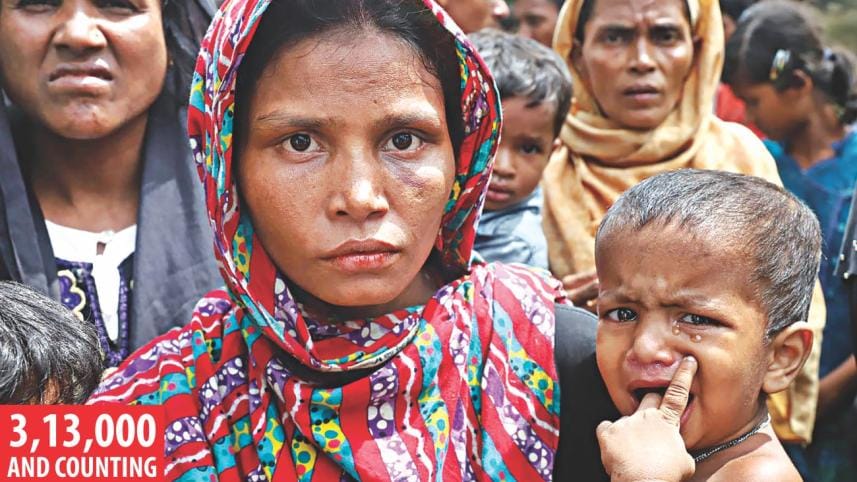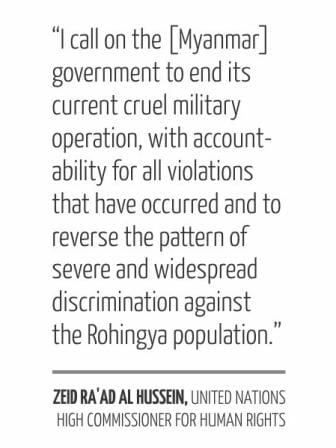Textbook case of ethnic cleansing

The United Nations has denounced Myanmar's "brutal security operation" against Rohingyas in Rakhine State as a "textbook example of ethnic cleansing".
Zeid Ra'ad al-Hussein, the UN high commissioner for human rights, yesterday told the 36th session of the UN Human Rights Council in Geneva that the operation is disproportionate to insurgent attacks carried out last month.

The statement by a top UN official came when Myanmar increasingly finds itself in diplomatic isolation as atrocities against the country's minority group creates a humanitarian crisis.
The UN has appealed for aid and Dhaka urged the global community to come up with urgent assistance to deal with the Rohingya influx towards Bangladesh since violence erupted in Myanmar on August 25.
Yesterday, the estimate of refugee arrivals reportedly reached 3,13,000, an increase of 19,000 in just 24 hours.
"I call on the [Myanmar] government to end its current cruel military operation, with accountability for all violations that have occurred, and to reverse the pattern of severe and widespread discrimination against the Rohingya population," Zeid added.
"The situation seems a textbook example of ethnic cleansing," said the official, according to a UN press release issued in Geneva yesterday.
The operation, which is ostensibly in reaction to militant attacks against 30 police posts on August 25, is clearly disproportionate and without regard for basic principles of international law, he observed.
"We have received multiple reports and satellite imagery of security forces and local militia burning Rohingya villages, and consistent accounts of extrajudicial killings, including shooting fleeing civilians."
The UN human rights chief cited reports that Myanmar authorities have now begun to lay landmines along the border with Bangladesh.
He said he is appalled to learn of official statements that refugees who have fled the violence will only be allowed back if they can provide "proof of nationality".

This measure resembles a cynical ploy to forcibly transfer large numbers of people without possibility of return, Zeid said, given that successive governments have since 1962 progressively stripped the Rohingya of their political and civil rights, including citizenship rights -- as acknowledged by Suu Kyi's own appointed Rakhine Advisory Commission.
Last year, the UN official added, he warned that the pattern of gross violations of human rights of Rohingyas suggested a widespread or systematic attack against the community, possibly amounting to crimes against humanity, if so established by a court of law.
Turning to the situation in Bangladesh, he said, "In Bangladesh, I encourage the government to maintain open borders for the Rohingya refugees, and I urge the international community's support in helping the authorities receive and better assist the refugee population."
Zeid appreciated Dhaka's constructive engagement with his office, and he would like to continue to work with the authorities to address the range of very serious human rights issues in the country.
The UN official also said he deplores current measures in India to deport Rohingyas at a time of such violence against them in their country. He mentioned that some 40,000 Rohingyas have settled in India, 16,000 of them received refugee documentation.
Noting New Delhi's obligations under international law, he said: "India cannot carry out collective expulsions, or return people to a place where they risk torture or other serious violations."

'SHOULD REMEMBER BUDDHA'
According to a news report of the Independent, UK, the Dalai Lama, the Buddhist spiritual leader of Tibet, said those carrying out the campaigns against Rohingyas "should remember Buddha".
"I think in such circumstances Buddha would definitely give help to those poor Muslims."
He said he had delivered the message to Myanmar's leader Aung San Suu Kyi several years ago at a meeting of Nobel Peace Prize laureates.
While Burmese Buddhists also worship the Buddha, they follow a different religious tradition than Tibetans and do not recognise the Dalai Lama as their spiritual leader, said the report.
"Those people who are sort of harassing some Muslims, they should remember Buddha," the Dalai Lama told journalists who asked him about the crisis on Friday evening, according to the Telegraph.

'ALLOW HUMANITARIAN AID'
Human Rights Watch said yesterday the United Nations, other multilateral organisations, and countries with influence should press the Myanmarese government to urgently allow humanitarian aid to reach Rohingyas at risk in Rakhine.
They should also ensure that adequate assistance reaches the more than 3,00,000 Rohingya and other refugees who have recently fled to Bangladesh following the military crackdowns.
"The humanitarian catastrophe that Burma's security forces have created in Rakhine State has been multiplied by the authorities' unwillingness to provide access to humanitarian agencies," said Philippe Bolopion, deputy director for global advocacy at Human Rights Watch.
"The United Nations, ASEAN, and the Organisation of Islamic Cooperation need to ramp up the pressure on Burma and provide more assistance to Bangladesh to promptly help Rohingya and other displaced people."
Rohingya refugees in Bangladesh told Human Rights Watch that Myanmar's security forces had carried out armed attacks on villagers, inflicting bullet and shrapnel injuries, and burned down their homes.
The killings, shelling, and arson in Rohingya villages have all the hallmarks of a campaign of "ethnic cleansing," Human Rights Watch said.
International aid activities in much of Rakhine have been suspended, leaving approximately 2,50,000 people without food, medical care, and other vital humanitarian assistance.
Refugees told Human Rights Watch that while many people from Maungdaw township could escape to Bangladesh, tens of thousands of displaced Rohingya are still hiding in the areas surrounding Rathedaung and Buthidaung Townships.
In another development, the Unitarian Universalist Service Committee (UUSC), a US-based international human rights organisation, has urged the US Senate to oppose a provision in the National Defence Authorisation Act that authorises an expansion of military ties with the Burmese military.
The group charged that the defence bill would further enable attacks against that country's Rohingya minority civilians by the Myanmar military. That bill is expected to be up for a floor vote today.
Tom Andrews, president and Chief Executive Officer of UUSC and a former Member of the US Congress, alternately urged in a statement on Friday, "We ask all Senators to support Senate Amendment 607 to the National Defence Authorisation Act that has been introduced by Senators Markey, Gardner and Cardin. That bipartisan amendment would cut off military assistance to Burma."



 For all latest news, follow The Daily Star's Google News channel.
For all latest news, follow The Daily Star's Google News channel.
Comments